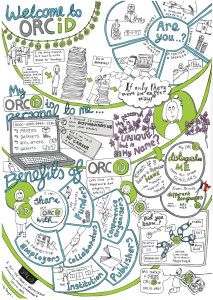What is ORCID?
ORCID, or Open Researcher and Contributor ID, is an organization that aims to ensure that all scientific works can be appropriately attributed to their authors. By providing members with unique 16-digit persistent digital identifiers (called ORCID identifiers) and maintaining a central registry of members, ORCID is rapidly taking hold in the research community as a means of improving the accuracy of attribution, collaboration, and funding.
Due to the ever-expanding and international nature of scientific literature, the need for a unique identifier has become increasingly apparent. First and last names can be unreliable and inaccurate due to cultural differences in name-order conventions, changing last names due to marriage, or inconsistent use of abbreviations or initials. All of these factors can lead to the unfortunate result of authors being incorrectly credited (or worse, not credited) for their work.
The use of ORCID identifiers actively prevents this potentially damaging mishap, instead allowing journals and institutions to accurately monitor individual authors’ contributions to science.
In November 2014, ORCID formally announced that they had reached their one-millionth registrant. This is an extremely exciting development for scholarly publishing and the scientific community, which is rapidly transitioning into the digital world.
With more and more ORCID users, the scientific community is one step closer to seamless data integration for articles, patents, and citations, across multiple publishing platforms and institutions.
Author Level Metrics
In addition to the aforementioned benefits, the ORCID registry maintains a unique URL for each member, which serve as individual author profiles for those registered. Although this may seem like just another profile to maintain, the ORCID record proves far more versatile than your average user profile.
ORCID will automatically log all objects associated with a given ORCID identifier, providing authors with a persistent and effortless “digital curriculum vitae.” Authors can choose to manually upkeep their profiles by adding information such as employment history, a biography, or even manage their privacy settings. The ID will follow an author for the entirety of their career, and allows authors to attach their ID to digital objects other than manuscripts such as datasets and patents.
In the future, users can expect the addition of new features, such as ORCID’s plan to work with the Consortia Advancing Standards in Research Administration Information to begin tracking peer review contributions.
ECS AND ORCID
ECS formally announced its involvement with ORCID in the spring 2014 issue of Interface. Presently, all ECS journals are compatible with ORCID, and ECS continues to look for ways to integrate the ORCID identifier into other systems such as ECS Meeting Abstracts, ECS Transactions, and its rapidly developing open access program.
ORCID is open and nonprofit, so it is free to sign up. Authors can either register via the link from the ECS journals submission site (ExP), or go directly to the ORCID site and then add the ID to their ExP profiles.
This article was written by Logan Streu, ECS Content Associate, ![]() orcid.org/0000-0002-7558-6777.
orcid.org/0000-0002-7558-6777.


